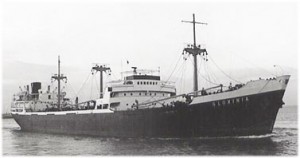Old Glox’ Ghost
By Capt. GW Mortimer
(The Compass Magazine Sept/Oct 1969)
Submitted by TASC Member George Wade 
‘So you’re not superstitious – you don’t believe in ghosts’
Neither did the master of the Steamship Gloxinia.
Until I served in the old Gloxinia I was strongly opposed to any opinions that supported beliefs in ghosts and supernatural apparitions, spirits, and the restless dead. When I left that ship, I had an open mind on the subject and now will listen with some sympathy to narratives of experience with unearthly forces. Sailors as a group tend toward easy acceptance of superstition and belief in the hyperphysical. It has been written that ignorant people in general tend to these beliefs naturally, the supposition being that the educated mind can provide reason and explanation for most occurrences within the bounds of live agency.